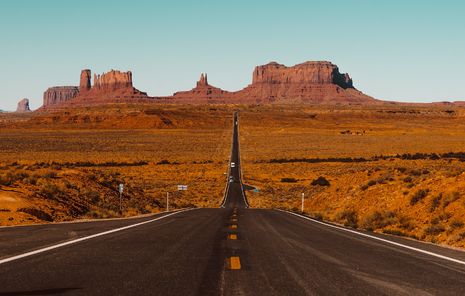Hit the Road: A rare and warming roadtrip through the steppe of Iran
Reuben J Brown reviews Panah Panai’s Hit the Road and suggests that the roadtrip film takes you along for a jolting ride

Iranian director Panah Panahi’s new film Hit the Road begins with an impressive, slowly twisting long-shot around the interior of a cramped S.U.V. parked up on the side of a road. The scene has a feeling of helplessness, the colours are grey. ‘Where are we?’ asks a raggedy man with an Ai Wei Wei look, leg resting on the centre console bound up in a cast. ‘We’re dead!’
And so we are introduced to this rag-tag family’s youngest son (played by the fantastic Raya Sarlak), around seven years old and bounding with mischief, light, and humour; who, trying to escape his mother’s search for his cell phone, leaps out of the car and up a mound, only to be swiftly overwhelmed by the scenery, saying ‘thank you, God,’ before kneeling to the ground and kissing it.
Eventually wrestled back into the car, though, the team is assembled, and the journey can begin. The stray-bearded father (Hassan Madjooni) delivers a malaised series of instructions (‘belt, rear mirror, side mirror, handbrake, clutch, gear, blinker’) to his elder son, before the boy yells ‘onwards!’, slicing the air with his hand in a forward gesture. The car jolts into reverse.
“Right from the start, you’re along for the jolting, jump-starting journey”
The last time we see these characters all together, the scene will not be so sharply funny, nor so claustrophobically packed; but where this family is going, and where they have been, I’ll leave for you to find out: this is a road trip movie, and right from the start, you’re along for the jolting, jump-starting journey.
Through hills that bear the striping pinks and yellows of pistachios, and a lush green steppe moistened with thick white fog — each of Iran’s exquisite landscapes receiving a hilarious, yet profoundly touching prayer of gratitude from the young son, pre-empted by the film’s end with a wry ‘here we go again’ from the father — Hit the Road is an enchanting affair, filled with magic, mystery, and beauty.
Taking in a neon-clad cyclist, wool-helmeted dirt-biker, and riddling sheepskin salesman, the travellers halt and struggle along, stopping and starting in an absurdity that sometimes drifts into a surrealist commentary on the journey of making the film itself. In a recent interview with The Guardian, Panahi (son of the highly decorated, and now imprisoned filmmaker Jafar Panahi), tells of Iran’s ‘heterogeneous, unpredictable, completely illogical system’, forced to write uplifting government-friendly dummy scripts in order to receive filming permits. ‘What an education we’re giving him,’ the father says of the young son in Hit the Road, ‘All lies!’ The mother jokes.
"Hit the Road is an enchanting affair, filled with magic, mystery, and beauty”
Played by Pantea Panahiha, who carries a magnetic screen presence, the mother grounds the film’s emotional beats. Yes: she can dance and sing and play along with the rest of them, but it is in her moments of quiet, letting the wind-swept branch of a bush stroke her forehead in the sunset, that her power and elegance truly pull you in, adding a knowing maturity to her son’s teetering sensitivity to the world. It is a performance of great range and measure, knowing just when, and by how much, to lose control.
All of this is not to say that the film is perfect. Bahram Ark’s performance as the elder son doesn’t quite do enough to deserve the constant affections of his little brother shouting ‘Bro! Where’s Bro?’, and by transmissive extension, of us the audience. From the first shot he seems already deep in a troubled journey, clouded by the dread of someone with the farthest still to go; and while the family’s other members constantly modulate and spark, he fails to break through. It is in his two scenes of dialogue alone with either his mother or father that the film begins to drag.
But these are minor issues in an otherwise water-tight script regularly punctuated by laughs of such delightful absurdity you begin to forget how heavy the film’s subject matter really is. The impossibility of letting go, pulling with great tension inwards and outwards like a Marina Abramović performance (in the child tied to a tree, straining and screaming to see his older brother; in a red plastic chair, swirling around a wheat field in the back of shot, later found attached to Jessy, the family dog who refuses to be lost or put down); the grief of losing friends and family, not knowing when, or if, they will return. And there is a climate change narrative here, too: the loss of landscape, and its memory: ‘This is the Urmia lake,’ the father says, ‘Well, it was. Once. Years ago, we would swim in it. Nowadays, you can only have a dust bath.’
Over this cracked-open lakebed plays out the film’s final scene: father, and youngest child singing and dancing along to Farsi pop music, mother barely holding it together, silver S.U.V. tearing across the flatland.
‘But leaving isn’t / The answer to the pain,’ the song plays out: ‘You took the road / toward sunset / And not toward sunrise / It’s getting dark, come back’.
 News / Cambridge academics stand out in King’s 2026 Honours List2 January 2026
News / Cambridge academics stand out in King’s 2026 Honours List2 January 2026 Interviews / You don’t need to peak at Cambridge, says Robin Harding31 December 2025
Interviews / You don’t need to peak at Cambridge, says Robin Harding31 December 2025 Comment / What happened to men at Cambridge?31 December 2025
Comment / What happened to men at Cambridge?31 December 2025 Features / “It’s a momentary expression of rage”: reforming democracy from Cambridge4 January 2026
Features / “It’s a momentary expression of rage”: reforming democracy from Cambridge4 January 2026 News / Varsity’s biggest stories of 202531 December 2025
News / Varsity’s biggest stories of 202531 December 2025










